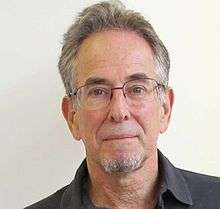Daniel Ben-Horin
Daniel Ben-Horin is an American social entrepreneur,[1] known for founding the technology assistance nonprofit CompuMentor, now known as TechSoup, in the late 1980s.[2] He is also a former journalist who has written for publications such as The Arizona Republic, The Nation, and Mother Jones.
Daniel Ben-Horin | |
|---|---|
 Ben-Horin in 2013 | |
| Nationality | American |
| Occupation | social entrepreneur |
| Title | Founder of TechSoup (formerly CompuMentor) |
Early life and education
Ben-Horin was born to Jewish parents from Latvia, who both emigrated separately to Palestine and met on a kibbutz in 1930. Ben-Horin's father was a Zionist activist and journalist. After the couple moved to Queens, New York in 1945, his mother earned an M.A. from Columbia University and became a probation officer for New York City.[3] He graduated from the University of Chicago in 1969 with a Bachelor of Arts degree.[3]
Career
Journalism and socialist views
After college, Ben-Horin lived in Phoenix, Arizona for six years,[3] where he worked at The Arizona Republic before becoming an editor of the Phoenix New Times.[4] In 1974, Ben-Horin moved to San Francisco.[3] He has written for publications such as The Nation,[5] Mother Jones[6] and Redbook.[7]
Ben-Horin has described himself as a "child of the '60s" who "believes in the phenomenon of a social zeitgeist"[8] and a "barely reformed Marxist".[9] In 1977 he wrote the article "Television Without Tears", a socialist analysis of television and its role in popular culture and ideology, which was published in the journal Socialist Revolution.[10][11]
Nonprofit career
From 1981-84, Ben-Horin served as the Executive Director of Media Alliance, a nonprofit association of media workers in the San Francisco Bay Area.[3] In 1985, Ben-Horin became involved in social entrepreneurship through Larry Brilliant and Stewart Page, the founders of the Whole Earth 'Lectronic Link (WELL),[12] after he encountered technologists who wanted to share their knowledge with nonprofits, but had no outlet to do so.[13] The following year, Ben-Horin approached WELL over a printer problem and was overwhelmed by the assistance he received in resolving the issue.[12] This led to him establishing CompuMentor in San Francisco in September 1986,[14] with the objective of trying to "help nonprofit organizations use available technical tools to produce better work and to activate a truly skilled sector of the population--technically adept people--by getting them into the community to do what they do best--talk about technology and teaching."[15]
In April 2009, Ben-Horin received the "Lifetime Achievement Award" from the Nonprofit Technology Enterprise Network (NTEN), and two months later the Ashoka Foundation elected Ben-Horin as a Senior Fellow for his work.[16] The NonProfit Times named Ben-Horin in its Top 50 most influential people in the nonprofit sector four years in a row from 2004 to 2007.[17]
Ben-Horin was the CEO of TechSoup until 2013, when he became Founder and Chief Instigator,[18] with Rebecca Masisak replacing him as CEO.[19] As of 2017, TechSoup Global had a staff of 212 and an annual operating budget of $34 million.[20]
References
- Praszkier, Ryszard; Nowak, Andrzej (10 October 2011). Social Entrepreneurship: Theory and Practice. Cambridge University Press. pp. 94–99. ISBN 978-1-139-50433-1.
- "Disconnecting from the Network". The NonProfit Times. 15 May 2011. Retrieved 25 September 2017.
- Ben-Horin, Daniel (25 November 2007). "A Serious Side of Fun". The New York Times. Retrieved 25 September 2017.
- The Nation - Volume 216, page 238
- Armstrong, David (1981). A Trumpet to Arms: Alternative Media in America. South End Press. p. 346. ISBN 9780896081932.
- Mother Jones. Foundation for National Progress. 1979. p. 16.
- PC World, Volume 5 (1987), page 269
- "TechSoup sees upside for nonprofits in downturn". San Francisco Chronicle. 22 March 2009. Retrieved 25 September 2017.
- McInerney, Paul-Brian (1 January 2014). From Social Movement to Moral Market: How the Circuit Riders Sparked an IT Revolution and Created a Technology Market. Palo Alto, California: Stanford University Press. p. 144. ISBN 978-0-8047-8906-6.
- Ben Horin, Daniel (1978). "Television Without Tears". Australian Left Review. D.B. Young Pty.
- Ben-Horin, Daniel, TV Without Tears - Outline of a Socialist Approach to Popular Television (full article), Australian Left Review, 1(65), 1978, 26-39.
- Hawken, Paul (May 10, 2007). Blessed Unrest: How the Largest Social Movement in History Is Restoring Grace, Justice, and Beauty to the World. Penguin Publishing. ISBN 9781101202326.
- The Virtual Community: Homesteading on the Electronic Frontier by Howard Rheingold, pages 261-262 (Addison-Wesley 1993)
- Management Review. American Management Association. 1914.
Daniel Ben-Horin.
- Feldman, Diane (1977). A Match Made in Computer Heaven. Management Review, accessed via Questia. ISBN 9780231038393.
- "Daniel Ben-Horin". CrunchBase. Retrieved 25 September 2017.
- "Top 4-50 Equity and Influence Fueled Nation's Top Executives" (PDF). Non Profit Times. August 2015. Retrieved 30 September 2017.
- "Daniel Ben-Horin". Bloomberg News. Retrieved 25 September 2017.
- "Rebecca Masisak". CrunchBase. Retrieved 25 September 2017.
- "TechSoup". GuideStar.org. Retrieved 25 September 2017.
External links
- “Leading Large-Scale Change: Lessons from the Arab Spring”, Daniel Ben-Horin, The Compass Leadership Summit, October 25, 2011, Santa Barbara, California
- “Networks of Resources, Networks of Ideas, Connecting the Dots”, Daniel Ben-Horin, Personal Democracy Forum 2011, June 7, 2011, New York, New York
- "Conference Sektor 3.0" Daniel Ben-Horin opening remarks at conference in Warsaw, Poland May 23–24, 2011
- "Technology for Local Empowerment," Third Global Forum on Telecentres Daniel Ben-Horin opening remarks at conference in Santiago, Chile, April 5, 2011
- "Tech Philanthropy," KQED-FM Public Radio Forum Podcast interview with Daniel Ben-Horin, February 17, 2009
- "Tactical Philanthropy Podcast: Daniel-Ben Horin" Podcast interview by Sean Stannard-Stockton, Tactical Philanthropy, May 25, 2007